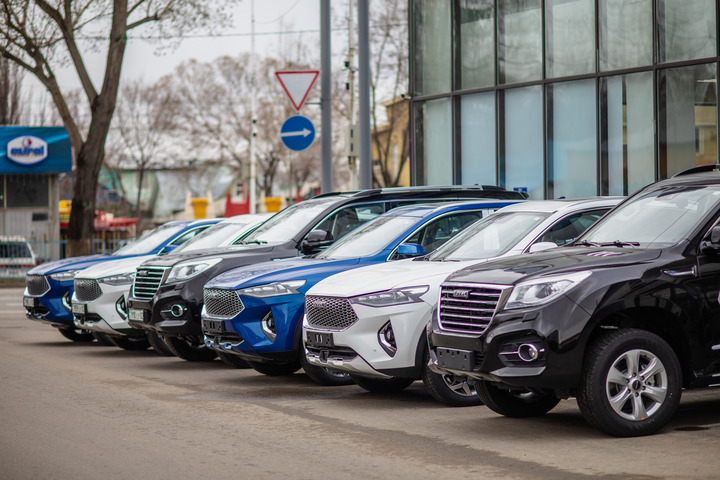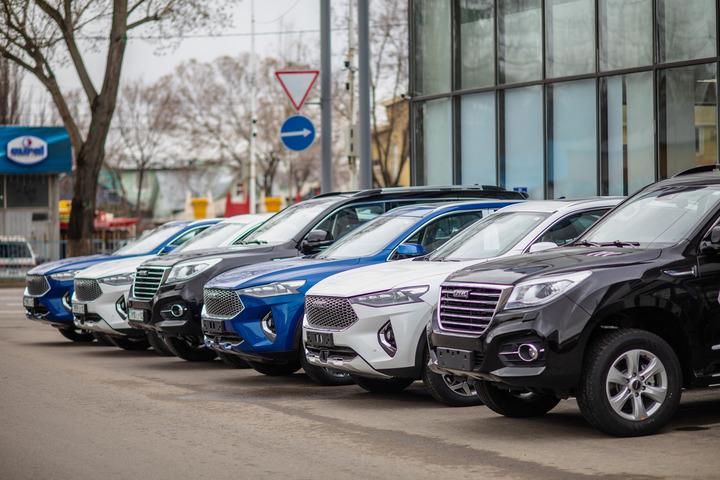
Photo taken on April 1, 2021 shows HAVAL cars outside a dealer shop in Almaty, Kazakhstan. (Astana Motors/Handout via Xinhua)
BEIJING, Sept. 1 (Xinhua) -- The leading Chinese self-owned automobile brands are expanding their business overseas and are taking over more and more market share in new energy vehicles worldwide, which shows the strong competitiveness of the Chinese auto industry, according to the industry experts.
For example, Haval, a brand under a Chinese leading automaker Great Wall Motors (GWM), recently announced that it would no longer sell gas-powered cars by 2030. This marks the full transformation of another Chinese major automaker towards new energy vehicle (NEV) sector after China's leading NEV manufacturer BYD's announcement in April to cut off its business of gas-powered cars and go full-time on NEV.
Haval is transforming to fully embrace the NEV sector and will increase the sales of its NEV to 80 percent by 2025 and halt the sales of gas-powered cars by 2030, GWM said at the brand's New Energy Strategy Launch Event on August 22.
Meanwhile, GWM also launched Haval's third-generation H6 DHT HEV and established a new management team to promote the development of GWM's new energy and smart products from brand marketing to technology Research and Development (R&D).
According to the report from China International Trust Investment Corporation (CITIC) Securities, as the pioneer of Haval's new energy strategy, Haval H6 PHEV (plug-in hybrid electric vehicle) is expected to establish the brand image as a "national SUV (sport utility vehicle)" with its alternative internal combustion engine. The outstanding performance helps the company gain more market share in new energy vehicles sector.
-- Transformation toward new energy gears up in China
Several Chinese automakers announced their full transformation towards new energy in succession since this year.
On April 5, BYD, a leading new energy vehicle manufacturer, took the lead in announcing in its production and sales report, that it would halt the production of gas-powered vehicles from March 2022 and would focus on the business of EVs and PHEVs.
On May 27, GWM's commercial vehicle brand Changzheng automobile released the New Energy Declaration, announcing its cessation of the sales of gas-powered cars and full transformation towards new energy.
In terms of the product layout, Changzheng automobile will concentrate its efforts on new-energy urban logistics vehicles, smart sanitation vehicles and hydrogen-powered heavy-duty trucks.
On June 14, Geely's Hanma Technology announced that it would cease the sales of traditional gas-powered cars by December 2025 and would shift its focus to the NEV business, e-methanol vehicles, hybrid vehicles, hydrogen-powered vehicles and other green energy vehicles.
Many Chinese major automakers are making a schedule to stop selling gas-powered cars.
Specifically, GWM plans to fully stop the sales of gas-powered cars by 2025, while BAIC Group revealed that it would stop its self-owned brands' production and sales of traditional gas-powered passenger cars in China by 2025.
Meanwhile, foreign automakers including BMW are planning to stop the sales of gas-powered cars in the EU by 2030; Volkswagen Group, 2035. Volvo and Mercedes-Benz plan to complete the transition from gas-powered cars to EVs by 2030.
Governments around the world are speeding up the process of banning gas-powered cars.
It is noted that the Ministry of Industry and Information Technology (MIIT) is working with the National Development and Reform Commission (NDRC) and other related departments on the issue of banning the sales of gas-powered cars. According to the implementation plan of carbon peaking issued by the Hainan provincial government, the sales of gas-powered cars will be banned by 2030.
In addition, on June 8, the European Parliament passed a vote on a proposal from the European Commission to ban the sales of newly manufactured gas-powered cars and hybrid vehicles in the EU from 2035.
-- Chinese automakers accelerate to expanding overseas market
With the accelerating transformation of Chinese automakers towards new energy, Chinese new energy vehicles are enjoying an ever-larger international market share and the export of new energy vehicles has become a big takeaway.
According to the China Association of Automobile Manufacturers (CAAM), China’s car exports reached a record high in July 2022, among which are 54 thousand NEVs, a rapid increase of 89.9 percent on a monthly basis, and 37.6 percent year on year.
Many Chinese automakers are seeking a fast-track entry into the global market through international cooperation. On August 8, GWM and Emil Frey Group, a Swiss group of companies mainly active in the auto business, signed a deal on their strategic cooperation on the import and distribution of WEY and ORA cars in the European market. The new cars will be delivered in the fourth quarter of this year.
On August 12, GWM signed a distribution agreement with OTE, a subsidiary of Saud Bahwan Group, the auto agent of Oman, reaching a medium and long-term strategic cooperation with OTE.
On August 1 this year, BYD announced its cooperation with Hedin Mobility Group as its European dealer, providing new energy cars for Sweden and Germany. On July 21, BYD Japan made its debut in the Japanese passenger cars market and released ATTO 3, DOLPHIN and SEAL.
Cui Dongshu, secretary-general of the China Passenger Car Association (CPCA), said that the two main destination markets for Chinese new energy cars are Asia and Europe.
Cui added that due to problems facing the international supply chain caused by the pandemic, the export sales of Chinese cars are experiencing a great surge. A strong export momentum is still maintained in 2022, which shows the significant improvement of the Chinese auto industry's competitiveness in the global market.
According to CITIC Securities, policies in favor of new energy cars introduced by governments all over the world, including government subsidies and low tariffs, provide a golden period for Chinese automakers' overseas expansion. The overseas sales of Chinese cars are expected to reach 3 million vehicles in 2025 and 5.5 million vehicles in 2030, respectively, while the sales of Chinese EVs are expected to reach 2.5 million vehicles in 2030. (Edited by Jiang Feifan with Xinhua Silk Road, 346129473@qq.com)




 A single purchase
A single purchase









